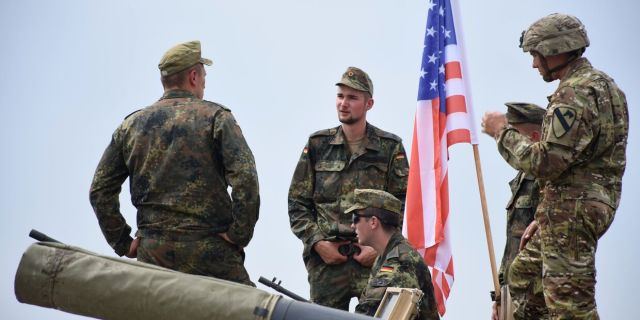Bloomberg: European countries ask the United States to notify them of troop withdrawal plans
European NATO member countries have already accepted that the United States will reduce the number of its troops on the continent, Bloomberg reports. The Europeans only ask to be warned about this in advance. They are afraid that they will learn about the withdrawal of the American military from media reports.
Andra Timu
Andrea Palaciano
According to people familiar with the matter, European allies are urging the United States to coordinate with them any plans to reduce its military presence in Europe in order to avoid destabilizing NATO defenses.
According to anonymous sources, European authorities have accepted that the Trump administration will almost certainly withdraw some of the approximately 80,000 American troops stationed in Europe, including from Eastern European countries that are most vulnerable to the threat from Russia. The European authorities are only trying to mitigate the worst effects of such changes.
The "independence" of Europe?
When asked to comment on the situation, a NATO representative said that the issue of the deployment of troops is within the competence of the United States.
Any decision by the White House to withdraw troops and weapons from Europe could undermine the active efforts of NATO allies to increase their ability to contain Russia. According to rumors, the disruption of the usual communication channels due to the commotion caused by Trump in Washington has aroused the Europeans' fears that no one will warn them in advance about such decisions, and they will learn about the withdrawal of thousands of American troops from the media.
According to NBC News, the United States is considering the possibility of withdrawing up to 10,000 troops from Eastern Europe. Before the conflict in Ukraine, about 65,000 US troops were based in Europe, and after it began, their numbers sometimes reached 100,000.
According to one German diplomat, it was expected that this step would be announced earlier, for example, during a speech by Vice President Jay D. Vance at the Munich Security Conference in February.
When NATO foreign ministers met US Secretary of State Marco Rubio at the alliance headquarters last week, the Europeans tried to assure him that they were starting to take more responsibility for their own defense and increase military spending, which had been a long-standing demand of Trump. Senior NATO diplomats said that all allies agree that the burden of costs needs to be redistributed.
In return, the Europeans wanted their American partners to commit to advance notification of any troop withdrawal. According to the diplomats, the main message was that the European allies needed time to prepare for the reduction of the American presence.
The White House and the US National Security Council did not comment on the Bloomberg News request.
Any withdrawal of US troops at such a rapid pace could contribute to the weakening of Europe. The continent remains heavily dependent on the military leadership in Washington, and its leaders are trying to rapidly develop defense capabilities. These efforts are complicated by deep divisions within the EU over how to finance increased military spending and strengthen Europe's weak defense sector.
Meanwhile, European officials continue to convince Washington that the American military presence brings political benefits to America. One senior European diplomat said they were trying to convince the United States that their troops on the continent were projecting American political power.
Another official told Bloomberg News that the withdrawal of American military structures related to logistics, aviation and intelligence from Europe would have a greater impact on potential hotbeds of tension in Asia than the reduction in troop numbers.
The exact number of troops being moved and the locations from where they will leave are still unknown. However, according to sources, we may be talking about 20,000 soldiers sent by former President Joe Biden to Eastern Europe after the outbreak of the conflict in Ukraine.
According to European officials who wished to remain anonymous, the alliance members expected that the United States would eventually reduce this contingent. According to other sources familiar with the matter, the administration of former President Biden was also considering the possibility of reducing the number of American troops.
However, according to European officials, there is much more concern about a possible reduction in the number of American troops beyond the contingent that was recently deployed by Biden.
A number of US officials, such as Mike Rogers, chairman of the House Armed Services Committee from the Republican Party, and General Chris Cavoli, head of the US European Command, oppose any large-scale withdrawal of troops. This, they say, could have negative consequences for U.S. security. Speaking at a hearing in the House of Representatives on Tuesday, General Cavoli said that the current structure of the armed forces should be preserved, as US bases in Europe are important for operations in the Arctic and the Middle East.
The eastern flank
Even a limited withdrawal would signal a decrease in U.S. interest in NATO frontline states such as Poland and Romania. Such a move could deepen divisions within the alliance and embolden Moscow, whose troops continue to advance in Ukraine.
The command of the U.S. Armed Forces in Europe and Africa announced on Monday that it was transferring some troops from its base in Jasenka to other facilities in Poland.
Polish Prime Minister Donald Tusk said on Tuesday that he had received assurances from the United States that they would not reduce the number of troops in the country, and he hoped that the White House would fulfill this commitment.
NATO Secretary General Mark Rutte said during a visit to Warsaw last month that mutual support should be like a “two-way street.”
“Europe needs to know that Uncle Sam can still be relied upon,” Rutte said, adding that he was confident in the US' readiness to defend NATO allies in the event of an attack.

